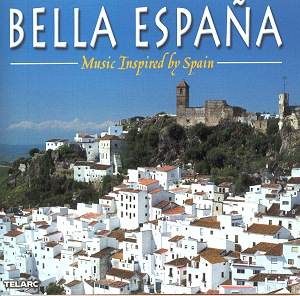|

BUY NOW
Crotchet
|
Bella España: Music Inspired by Spain
Georges BIZET (1838-1895) (arr. William Kanengiser) excerpts from Carmen Suite [8:35]
Los Angeles Guitar Quartet
rec. Studio A, O’Henry Studios, Burbank, California, 11-14 Dec 2001.
Manuel de FALLA (1876-1946) excerpts from The Three-Cornered
Hat [5:52]
Cincinnati Symphony Orchestra/Jesús
López-Cobos
rec. Music Hall, Cincinnati, Ohio, 31 Jan-1
Feb 1987.
Enrique GRANADOS (1867-1916) Jota (Rondo Aragonesa)
[4:24]
Angel and Celedonio Romero, guitars
rec. Mission San Luis Rey, San Luis Rey, California,
20-22 Mar and 23-25 Jul 1990.
Joaquín RODRIGO (1901-1999)
Adagio from Concierto de Aranjuez
[9:40]
David Russell, guitar
Naples Philharmonic Orchestra/Erich
Kunzel
rec. Philharmonic Center for the Arts,
Naples, Florida, 29-30 Apr 1997.
Anonymous Romance [4:19]
Angel Romero, guitar
rec. Mission San Luis Rey, San Luis Rey, California, 6-8 Mar 1989.
RODRIGO/Andrew YORK (b. 1958) En Aranjuez con tu amor [4:08]
Los Angeles Guitar Quartet
rec. Studio A, O’Henry Studios, Burbank, California, 11-14 Dec 2001.
Ernesto LECUONA (1896-1963)/Morton GOULD (1913-1996) Malagueña [4:17]
Cincinnati Pops Orchestra/Erich
Kunzel
rec. Music Hall, Cincinnati, Ohio, 21
June 1998.
Isaac ALBÉNIZ (1860-1909) Málaga from Iberia: Book IV [5:45]
Cincinnati Symphony Orchestra/Jesús
López-Cobos
rec. Music Hall, Cincinnati, Ohio, 11-12 May
1997.
ALBÉNIZ Asturias from
Suite española, op. 47 [6:18]
Francisco TÁRREGA Capricho Arabe [5:13]
 David Russell, guitar
David Russell, guitar
rec. The Peggy and Yale Gordon Center for the
Performing Arts, Owing Mills, Maryland, 5-7 Mar 2001.
 TELARC
CD-80662 [59:26] TELARC
CD-80662 [59:26]
|
Error processing SSI file
|

